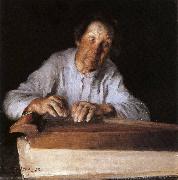Porslinet engros- Olja måleriet Engros- Måleriet Porslinet |
|||||||||||

|
|||||||||||
|
|
|
||||||||||||||
|
Pekka Halonen
Pekka Halonen (23 September 1865 - 1 December 1933) was a painter of Finnish landscapes and people. He was born in Lapinlahti. He lived with his family in a home and studio on Lake Tuusula in Järvenpää, Finland that he, himself, designed and named Halosenniemi. The beautiful and serene building is now a museum that includes original furnishings and Halonenes own art on the walls. There, on the shores of Lake Tuusula where Pekka Halonen resided, an artistse community developed and flourished, helping to develop a sense of Finnish national identity. Halosenniemi was designed with the two story studios of Paris in mind with high ceilings and tall windows in the studio and second floor living quarters accessible by a set of stairs and a balcony that overlooked the studio. Adjacent to the house, Halonen built a sauna and, in typical Finnish tradition, the sauna also served as a laundry. Halonen stated that he never painted for anyone but himself. He felt that eArt should not jar the nerves like sandpaper - it should produce a feeling of peace.e His father was a peasant from Lapinlahti. Halonen studied at the Art Society's drawing school in Helsinki. In 1890 he moved to Paris where he studied at the Academie Julian and later under Paul Gauguin. He died in Tuusula. There is a painting by Pekka Halonen in the post-impressionist section of the Museum of Fine Arts in Budapest, Hungary. Until May 2013 in the Groninger Museum, the Netherlands: Pekka Halonen, Eero Järnefeldt, Helene Schjerfbeck and Akseli Gallen Kallela in the exhibition 'Nordic Art: The Modern Breakthrough'. |
||||||||||||||
|
|
||||||||||||||
|
||||||||||||||
|
|
||||||||||||||
| Pekka Halonen
Pekka Halonen (23 September 1865 - 1 December 1933) was a painter of Finnish landscapes and people. He was born in Lapinlahti. He lived with his family in a home and studio on Lake Tuusula in Järvenpää, Finland that he, himself, designed and named Halosenniemi. The beautiful and serene building is now a museum that includes original furnishings and Halonenes own art on the walls. There, on the shores of Lake Tuusula where Pekka Halonen resided, an artistse community developed and flourished, helping to develop a sense of Finnish national identity. Halosenniemi was designed with the two story studios of Paris in mind with high ceilings and tall windows in the studio and second floor living quarters accessible by a set of stairs and a balcony that overlooked the studio. Adjacent to the house, Halonen built a sauna and, in typical Finnish tradition, the sauna also served as a laundry. Halonen stated that he never painted for anyone but himself. He felt that eArt should not jar the nerves like sandpaper - it should produce a feeling of peace.e His father was a peasant from Lapinlahti. Halonen studied at the Art Society's drawing school in Helsinki. In 1890 he moved to Paris where he studied at the Academie Julian and later under Paul Gauguin. He died in Tuusula. There is a painting by Pekka Halonen in the post-impressionist section of the Museum of Fine Arts in Budapest, Hungary. Until May 2013 in the Groninger Museum, the Netherlands: Pekka Halonen, Eero Järnefeldt, Helene Schjerfbeck and Akseli Gallen Kallela in the exhibition 'Nordic Art: The Modern Breakthrough'. Oil on canvas. Date 1892(1892) cyf |
||||||||||||||
|
Related Paintings to Pekka Halonen :. |
||||||||||||||
|
|
||||||||||||||
|
|
||||||||||||||
|
KOMMA I KONTAKT MED Oss |







